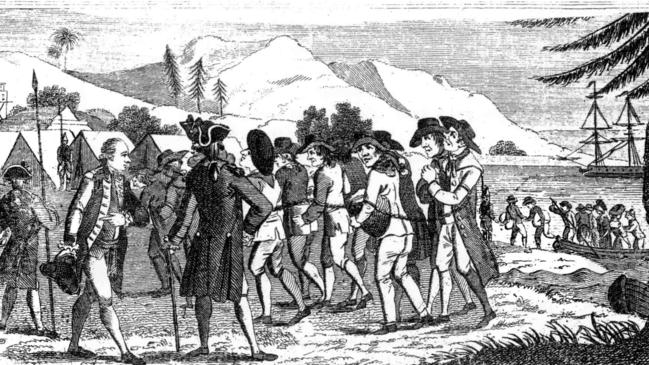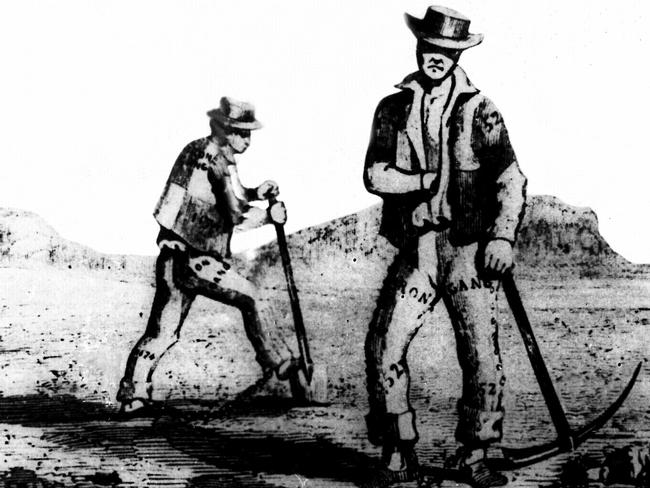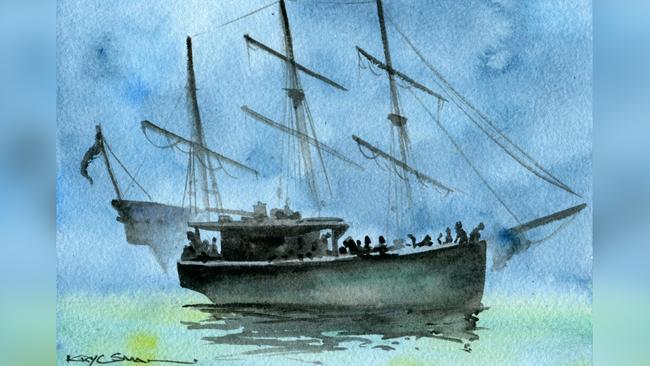
The appeal of stopping the boats stretches way back in Australian history, before Federation, long before Tony Abbott etched the phrase into our national psyche. Indeed, the very impetus for uniting the Australian colonies emerged directly out of a campaign to end the transportation of convicts.
By the 1840s, grassroots organisations had sprung up throughout eastern Australia — especially in Tasmania, where the number of exiles had grown to two for every free person. By 1851 they had united as the Australasian Anti-Transportation League, whose flag — the Union Jack and Southern Cross, on a blue background — would ultimately become the Australian flag.
Labor’s politically courageous decision to force a law on to the government that compels it, in effect, to bring asylum-seekers to the mainland as soon as possible has parallels with the ill-fated defence of convict arrivals in the mid-19th century.
The Sydney Morning Herald, cheering on the League, wrote in 1850 that “the honour, the character, the dearest hopes of our beautiful and beloved land depend” on ending transportation. Not to end it would condemn Australia to “the scorn of mankind as the willing — the abject — the self-polluted receptacle and home of felons and criminals of every hideous class, grade and order of depravity”.
That was the popular view, however unfair.
Convicts had built much of early white Australia, after all.
By the 1840s, the increasingly numerous immigrant free settlers saw convicts, even reformed ones, as an indelibly bad, corrupting influence. The NSW Legislative Council had received 36,000 signatures against transportation and 525 in favour by 1850. That was a lot; consider that the area that would soon become Victoria had a population of 77,000.
The rich squatters, meanwhile, wanted transportation to continue, partly to ensure flow of cheap labour, but also out of higher ideals of reforming the convicts.
James Macarthur, then among the richest men in the southern hemisphere, proposed as a compromise that three free settlers be sent for every convict.
William Wentworth backed the British government, which wanted to revive transportation, having ended it to NSW in 1840.

As David Kemp puts it in his marvellous new history of Australia, The Land of Dreams, Wentworth made the moral case: “Human sympathy and compassion for the convicts should lead Australia not to deny them the reformatory benefits of the system.’’
Well-off inner-city Labor and Greens members similarly argue compassion dictates welcoming more refugees.
Kemp writes: “Wentworth was deeply resentful of the attacks on convicts and especially on the emancipists (former convicts), with whom he had been proud to associate himself.
“He loved his country with its remarkable achievements in building a new society, and all the abuse thrown at the old order by the new emigrants only reinforced his determination to defend what had been, what NSW had become, and what he was.’’
While the disparity isn’t nearly as great, the apparent plunge in support for the Labor Party in the wake of its push to bring hundreds of asylum-seekers to Australia suggests a minority in support of encouraging more boats.
Indeed, Labor was thrashed in the 2013 election, fought largely on the issue of border security, following the deaths of about 1200 people and 51,000 unauthorised arrivals on 800 boats.
Now, almost a quarter of Australians say they have a “somewhat negative” or “very negative” attitude towards immigrants of the Muslim faith, according to the Scanlon Foundation.
“The level of negative sentiment towards those of the Muslim faith, and by extension to immigrants from Muslim countries, is a factor of significance in contemporary Australian society,” it concludes from last year’s survey.

And an anonymous online survey by Scanlon last year found about 40 per cent of voters had a “very negative” or “somewhat negative” attitude towards Muslim immigrants. Only 7 per cent offered the same view of Buddhists. That might help explain attitudes to asylum-seekers, who are overwhelmingly from Muslim countries. The top five nationalities on Nauru are Iranian, Afghan, Pakistani, Sudanese and Iraqi.
Wentworth argued the prevailing dislike of convicts wasn’t fair, noting how they contributed to the economic life of the colonies and weren’t more likely to be arrested after being pardoned.
It’s harder for activists to make the economic case for refugees today. Of the 70,000 migrants from the Middle East and North Africa over the previous decade, 44,000 were either unemployed or not looking for work, according to the Australian Bureau of Statistics’ 2016 survey. Compare that to the 31,000 from southern and eastern Europe, of whom 3900 were in the same categories.
Asylum-seekers aren’t necessarily criminals, although 265 of the 1011 still on Nauru and Manus have been rejected by the US, owing to criminality or security concerns, as part of the settlement deal process with us.
A bigger difference is that convicts were inevitably poor and forced to come here, whereas asylum-seekers are well-off enough to pay people-smugglers.
Relaxing border security has logically increased the chance of future boat arrivals. If government bailouts lead to excessive risk-taking in banking, as many on the Left argue, the same argument applies to border security.
Convicts were likely to live better in Australia than in the squalor of mid-19th-century Britain. And they could only dream about the healthcare on Manus Island and Nauru, where there is a doctor for every seven refugees and a mental health worker for every 14, all in a tropical location. Moreover, Australia takes more refugees per capita than almost any other advanced country.
The moral case to continue transportation in the 1850s was probably stronger than that to relax border security laws today.
The strength of the political case for relaxing border security, while not as weak as supporters of transportation in the 1850s, appears to be shaky.



